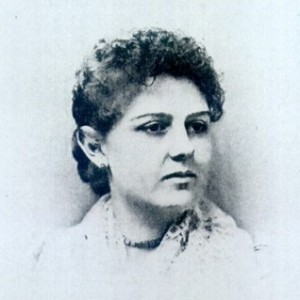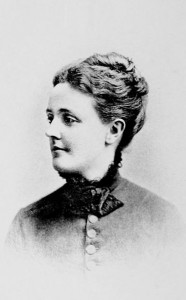I think it’s interesting how sometimes there are certain talents or interests that can run in families. I come from quite strong creative energies on both sides of my family. My mother’s side is both literary and artistic while my father’s side is quite artistic and musical. My brother and I came out with a smattering of talents from both sides of our genetics. I may talk about our artistic genetics in a future blog but for right now, I’m going to talk about our literary genetics.
The Great Unpublished Writer
 Nellie Newell (nee Rulon), pictured at left, was my great-great grandmother. She was my mother’s mother’s mother’s mother if that makes better sense. Born in 1870 in Monmouth, Illinois, she is a bit of a legend in my family for being tough but maternal and a woman with unfulfilled passions for the written word. When she was a baby, her parents took a steamer on the Mississippi and she was kidnapped by a fellow passenger. The captain announced that nobody would be allowed to disembark until she was safely returned to her family, and a few hours later, baby Nellie was found on the deck by herself. Nellie was raised in a home filled with music and creativity, in a family in which women were taught to think and act for themselves, yet still remain feminine and dedicated to family. Her mother, Jennie Rulon (nee Ross), wrote poetry sometimes and played the piano and sang, but little Nellie was the one who showed real literary talent. Nellie also played the piano, organ and guitar.
Nellie Newell (nee Rulon), pictured at left, was my great-great grandmother. She was my mother’s mother’s mother’s mother if that makes better sense. Born in 1870 in Monmouth, Illinois, she is a bit of a legend in my family for being tough but maternal and a woman with unfulfilled passions for the written word. When she was a baby, her parents took a steamer on the Mississippi and she was kidnapped by a fellow passenger. The captain announced that nobody would be allowed to disembark until she was safely returned to her family, and a few hours later, baby Nellie was found on the deck by herself. Nellie was raised in a home filled with music and creativity, in a family in which women were taught to think and act for themselves, yet still remain feminine and dedicated to family. Her mother, Jennie Rulon (nee Ross), wrote poetry sometimes and played the piano and sang, but little Nellie was the one who showed real literary talent. Nellie also played the piano, organ and guitar.
My great-great grandfather, Benjamin, married her in 1890 and their marriage was quite modern for the times in that he supported her interests outside of raising children. She continued to write through her marriage after they set up their new family in Denver, Colorado (now you see how I was born in Denver). For the most part, she was drawn to poetry and songwriting, probably due to the influence of her mother. Later in life, Nellie wrote a song called “Beautiful Colorado” and her son-in-law, Bob Galbreath, was a patent attorney and had a copyright drawn up. The song came back with a letter attached that said because the song was written by a woman, it would never be published. Nellie was heartbroken, as it took months for her to compose the song, and she tossed it into the kitchen fire. Her dreams of being published went up the chimney with that song and she never saw her own work in print.
I grew up hearing this story throughout my life and when I began publishing my own poetry, I decided to fulfill Nellie’s dream for her by including her poetry in my book. You can see it for yourself by checking out the title Mist of the Mountains at http://www.jessicajewettonline.com/books
The Great Published Writer
 You may know my cousin better than you would my grandmother. I’m related to Sarah Orne Jewett through my mother’s father, who was a Jewett. Sarah was born in 1849 and was much more successful with her literary career. Her father was a doctor, which is still a career tradition in the family, and Sarah accompanied him on house calls throughout her childhood. That introduced her to many of the people and places in coastal Maine that would later heavily influence her literary development. Sarah’s first important published work was at the age of 19 in the Atlantic Monthly, which was a popular magazine at the time. She continued steadily publishing short stories and novels for the rest of her life, including A White Heron, A Country Doctor, and The Country of the Pointed Firs. She counted most American literary figures of the 19th century as her friends, such as Willa Cather, Mary Ellen Chase, William Dean Howells, Henry James, Rudyard Kipling, Harriet Beecher Stowe, Alfred Tennyson, Oliver Wendell Holmes, Mark Twain, Sarah Wyman Whitman, Henry Wadsworth Longfellow, Nathaniel Hawthorne, Lydia Maria Child, Charles Dudley Warner and John Greenleaf Whittier, as well as Edwin Booth, brother of John Wilkes Booth. In 1901, she was given an honorary degree from Bowdoin College, an institution that would not even admit female students until well into the 20th century.
You may know my cousin better than you would my grandmother. I’m related to Sarah Orne Jewett through my mother’s father, who was a Jewett. Sarah was born in 1849 and was much more successful with her literary career. Her father was a doctor, which is still a career tradition in the family, and Sarah accompanied him on house calls throughout her childhood. That introduced her to many of the people and places in coastal Maine that would later heavily influence her literary development. Sarah’s first important published work was at the age of 19 in the Atlantic Monthly, which was a popular magazine at the time. She continued steadily publishing short stories and novels for the rest of her life, including A White Heron, A Country Doctor, and The Country of the Pointed Firs. She counted most American literary figures of the 19th century as her friends, such as Willa Cather, Mary Ellen Chase, William Dean Howells, Henry James, Rudyard Kipling, Harriet Beecher Stowe, Alfred Tennyson, Oliver Wendell Holmes, Mark Twain, Sarah Wyman Whitman, Henry Wadsworth Longfellow, Nathaniel Hawthorne, Lydia Maria Child, Charles Dudley Warner and John Greenleaf Whittier, as well as Edwin Booth, brother of John Wilkes Booth. In 1901, she was given an honorary degree from Bowdoin College, an institution that would not even admit female students until well into the 20th century.
Although Sarah always came home to Maine, she also lived in Boston for different periods. She never married and there has been some speculation about her sexuality in modern times. The speculation comes from living with her best friend, Annie Fields, in what was known as “a Boston marriage” for most of her adult life. Boston marriages were the polite way to describe likely lesbian relationships at that time. There is no real concrete evidence either way but it was always accepted among my part of the Jewett family that Annie was basically her wife. Both women were rather forward thinking, favored “women’s emancipation”, and they were also quite philanthropic. Their relationship’s particulars are not so important as the work they did together in their lives. Annie was a source of inspiration and encouragement for Sarah, who might not have worked so hard at perfecting her craft without that influence.
Like my grandmother Nellie, I also grew up with stories from Sarah’s life. Her books were always in our house, although I never read them, and I was constantly reminded that I was “going to turn out just like Sarah.” The comparisons ran deep enough that as I plumped up in puberty, my grandmother started telling me how much I look like Sarah, which I always took as the highest compliment. Sarah’s influence has hung over my literary life so much that she was a big reason why I chose to publish under the name Jewett instead of Jones.
I suspect that as a dig more into the detailed lives of my family, I will find more writers. For now, it’s enough that I come from such strong women who had the courage to live by the courage of their convictions.
Read More













 by Thomas Desjardin and I just finished reading it. It took a while. I read over half of it a week after it was published but then life got in the way and I had to let it sit for a little bit. Tonight I finished it just in time to watch the women’s gymnastics Olympics competition without distraction. I think Chamberlain would want it that way, said tongue-in-cheek.
by Thomas Desjardin and I just finished reading it. It took a while. I read over half of it a week after it was published but then life got in the way and I had to let it sit for a little bit. Tonight I finished it just in time to watch the women’s gymnastics Olympics competition without distraction. I think Chamberlain would want it that way, said tongue-in-cheek.
